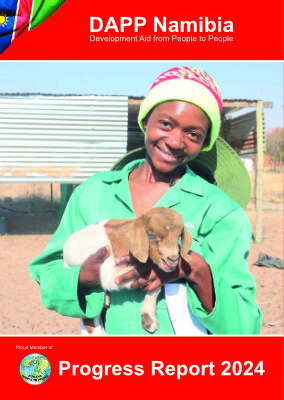“Farmers’ Clubs with Climate-Smart Agriculture for improved resilience and livelihoods of Small Scale Farmers in Kavango East and West ”
The Farmers’ Clubs project works with 1,000 small scale farmers in the Kavango East & West regions to mitigate the effects of climate change through the use of conservation agriculture methods to increase food production and household food security in an environmentally sustainable way.
The project is implemented jointly by DAPP Namibia and Namibia Nature Foundation and funded by the European Union through UFF in Finland. The fundamental structures through which the Farmers’ Clubs project is implemented are the self-sustaining clubs consisting of between 35 to 50 members in each club at the community level. Farming Instructors from the communities are employed to work together with the farmers in theory and practice. Through these structures the farmers are trained and share information about diversifying and rotating crops, implementing soil and water conservation methods, and finding ways to operate more efficiently and economically.
The programme creates momentum within rural communities toward positive, productive change that increases crop yields and income and improves the nutritional status and health of member families.
- Each Farmers’ Club has established a common demonstration garden where the project has assisted with fencing, irrigation from the river, a water tank, pipes and water pump as well as hand tools, wheelbarrows and seeds. This is where the club members meet under a shady tree for information sessions, planning and discussion with their Farming Instructor and where members have their own rows of vegetables to take care of.
- Farmers’ Club members are also having access to rain-fed demo fields where Conservation Agriculture (CA) methods are demonstrated by an Agriculture Technician. After seeing that the harvest from the demo fields achieved a much better yield than fields where the traditional methods were used many farmers were ready to practice the CA methods in their own fields.
The Farmers’ Clubs project is having 19 clubs with 730 active members.



